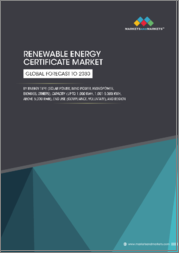
|
시장보고서
상품코드
1880438
재생에너지 인증서 시장 예측(-2032년) : 유형별, 에너지원별, 발전 프로젝트 용량별, 최종사용자별, 지역별 세계 분석Renewable Energy Certificate Market Forecasts to 2032 - Global Analysis By Type, Energy Source, Capacity of Generation Project, End User, and By Geography |
||||||
Stratistics MRC의 조사에 의하면, 세계의 재생에너지 인증서 시장은 2025년에 232억 달러 규모, 2032년까지 495억 달러에 이를 것으로 예측됩니다.
예측 기간 동안 CAGR은 11.4%를 보일 것으로 예측됩니다. 재생에너지 크레딧는 재생에너지로 생산된 전력의 환경적 속성을 나타내는 인증서를 추적하고 거래하는 제도입니다. 컴플라이언스 제도와 자율제도를 통해 발전사업자, 전력회사, 기업, 트레이더를 연결합니다. 그 장점으로는 재생에너지 도입을 지원하는 유연한 시장 기반 구조, 친환경 전력 추적의 투명성, 지속가능성 및 규제 목표 달성을 위한 수단, 물리적 전력 흐름을 변경하지 않고도 재생에너지 프로젝트 소유자에게 추가적인 수익원을 제공하는 것 등이 있습니다. 수 있습니다.
기업의 지속가능성을 위한 노력
세계 기업들이 탄소중립과 100% 재생에너지 사용을 약속하는 가운데, RECs는 이러한 주장을 뒷받침할 수 있는 유연하고 즉각적인 수단을 제공합니다. 기업은 물리적 전력 공급 체계를 변경하지 않고도 탄소 발자국을 상쇄하고 친환경 에너지 소비를 검증할 수 있습니다. 상업 및 산업 부문의 급증하는 수요는 컴플라이언스 중심 수요를 보완하는 견고한 자발적 시장을 형성하여 시장 규모와 유동성을 근본적으로 확장하고 있습니다.
검증과 투명성의 과제
추적 시스템의 불일치, 이중 계상 및 부정의 가능성은 인증의 신뢰성을 훼손하고 환경 주장에 대한 의구심을 불러일으킵니다. 이러한 보편적 표준화의 부재는 구매자의 신뢰를 떨어뜨리고, 특히 자신의 친환경적 기여를 확실한 증거로 증명하고자 하는 주체의 투자를 저해할 수 있습니다. 결과적으로, 이러한 문제들은 시장 성장을 억제하고 완전히 투명한 재생에너지 크레딧(RECs)가 얻을 수 있는 프리미엄 가치를 제한할 수 있습니다.
그린 수소 인증
수소를 '친환경'으로 인증하기 위해서는 수소 생산에 사용된 전력이 재생 가능한 에너지원에서 나온 것임을 검증해야 합니다. RECs는 이러한 보증을 제공하는 이상적인 수단이며, 새로운 고부가가치 인증 흐름을 창출합니다. 이 응용은 시장을 유망한 새로운 에너지 매체로 확대할 뿐만 아니라 수소 생산에 특화된 재생 에너지 프로젝트의 가치 제안을 높이고 시너지 효과가 있는 중요한 미래 시장을 개척할 수 있습니다.
PPA에 의한 경쟁
더 큰 영향력과 장기적인 가격 안정성을 원하는 기업들은 RECs를 우회하여 발전사업자와 직접 물리적 또는 가상 PPA를 체결하는 경향이 증가하고 있습니다. RECs가 유연성을 제공하는 반면, PPA는 신규 재생에너지 프로젝트에 대한 추가성 자금에 대한 보다 직접적인 권리를 보장합니다. 이러한 기업 조달 전략의 변화는 특히 규모가 크고 정교한 에너지 구매자층에서 자발적 RECs 시장의 성장을 억제할 수 있습니다.
COVID19의 영향:
코로나19는 초기에는 프로젝트 건설 지연과 공급망 병목현상을 통해 REC 시장을 혼란에 빠뜨렸고, 일시적으로 인증서 공급을 제한했습니다. 또한, 경제적 불확실성으로 인해 일부 기업들은 지속가능성 관련 지출을 연기하여 단기적으로 자발적 수요를 약화시켰습니다. 그러나 시장은 회복력을 보여줬고, 비즈니스 활동 재개와 함께 빠르게 반등했습니다. 또한, 이번 위기는 ESG 원칙에 대한 전 세계적인 관심을 불러일으켰고, 그 결과 기업의 청정 에너지에 대한 장기적인 노력을 강화하여 팬데믹 이후 시장 회복과 확장의 토대를 마련했습니다.
예측 기간 동안 컴플라이언스 분야가 가장 큰 시장 규모를 차지할 것으로 예측됩니다.
컴플라이언스 분야는 주로 정부의 법적 의무와 규제 정책에 힘입어 가장 큰 시장 점유율을 차지할 것으로 예측됩니다. 미국의 재생에너지 포트폴리오 기준(RPS) 및 전 세계적으로 유사한 제도와 같은 법규에 따라, 유틸리티 및 대규모 에너지 공급 사업자는 전력 공급의 일정 비율을 재생에너지로부터 조달하도록 법적으로 의무화되어 있습니다. 재생에너지 크레딧(RECs)는 이러한 사업자들이 규정을 준수하고 있음을 증명하는 수단입니다. 이로 인해 현재 시장 규모의 대부분을 차지하는 안정적이고 협상할 수 없는 수요 기반이 형성되었습니다.
예측 기간 동안 소규모 부문이 가장 높은 CAGR을 보일 것으로 예측됩니다.
분산형 에너지 발전의 세계적인 추세를 배경으로 소규모 부문이 가장 높은 성장률을 달성할 것으로 예측됩니다. 여기에는 주거용 및 상업용 태양광 발전 시스템과 풍력 시스템의 급속한 보급이 포함됩니다. 또한, 지원적인 순계량 정책과 기술 비용의 하락으로 더 많은 소비자들이 프로슈머(생산자 겸 소비자)가 될 수 있게 되었습니다. 이러한 소규모 설비에서 생산된 전력 단위당 재생에너지 크레딧(REC)가 발급되기 때문에 대규모 공급원이 빠르게 확대되고 있으며, 대규모 유틸리티 프로젝트를 능가하는 속도로 증가하고 있습니다.
가장 큰 점유율을 차지하는 지역:
예측 기간 동안 북미가 가장 큰 시장 점유율을 유지할 것으로 예측됩니다. 이는 미국 시장이 성숙한 규제 프레임워크, 특히 주정부 차원의 재생에너지 포트폴리오 기준(RPS)에 의해 관리되는 성숙한 미국 시장에 기인합니다. 이에 따라 컴플라이언스용 REC에 대한 수요가 지속적으로 증가하고 있습니다. 또한, 이 지역에는 매우 활발한 자발적 시장이 형성되어 있으며, 기업의 지속가능성 리더이 야심찬 환경 목표를 달성하기 위해 적극적으로 REC를 구매하고 있습니다. 높은 추적 시스템과 높은 유동성 덕분에 북미는 종합적인 가치와 거래량에서 현재 시장 리더로서의 입지를 더욱 확고히 하고 있습니다.
최고 CAGR 지역:
예측 기간 동안 아시아태평양은 중국, 인도, 일본 등의 국가에서 대규모 재생에너지 용량이 증가함에 따라 가장 높은 CAGR을 보일 것으로 예측됩니다. 각국 정부는 적극적인 국가 재생에너지 목표를 시행하고, 자체적인 컴플라이언스 시장을 구축하고 있으며, 이는 REC 수요를 직접적으로 자극하고 있습니다. 또한, 이 지역에서 급성장하고 있는 산업 부문이 자발적인 지속가능성 목표를 적극적으로 채택하고 있는 것도 성장과 병행하는 흐름을 만들어내고 있습니다. 이러한 하향식 정책 지원과 상향식 기업 수요가 결합하여 시장이 비약적으로 확대될 수 있는 강력한 환경이 조성되고 있습니다.
무료 커스터마이징 서비스:
본 보고서를 구매하신 고객님들께는 아래의 무료 맞춤화 옵션 중 한 가지를 선택하실 수 있습니다.
- 기업 프로파일링
- 추가 시장 기업 종합 프로파일링(최대 3개사)
- 주요 기업의 SWOT 분석(최대 3개사)
- 지역별 세분화
- 고객 요청에 따른 주요 국가별 시장 규모 추정 및 예측, CAGR(참고: 타당성 확인 필요)
- 경쟁사 벤치마킹
- 주요 기업의 제품 포트폴리오, 지리적 분포, 전략적 제휴를 기반으로 한 벤치마킹
목차
제1장 주요 요약
제2장 서문
- 개요
- 이해관계자
- 조사 범위
- 조사 방법
- 데이터 마이닝
- 데이터 분석
- 데이터 검증
- 조사 접근
- 조사 자료
- 1차 조사 자료
- 2차 조사 정보원
- 전제조건
제3장 시장 동향 분석
- 서론
- 성장 촉진요인
- 성장 억제요인
- 기회
- 위협
- 최종사용자 분석
- 신흥 시장
- COVID-19의 영향
제4장 Porter의 Five Forces 분석
- 공급 기업의 교섭력
- 바이어의 교섭력
- 대체품의 위협
- 신규 진출업체의 위협
- 경쟁 기업간 경쟁 관계
제5장 세계의 재생에너지 인증서 시장 : 유형별
- 서론
- 준수
- 자발적
제6장 세계의 재생에너지 인증서 시장 : 에너지원별
- 서론
- 태양광발전
- 풍력
- 수력발전
- 바이오매스 및 바이오에너지
- 지열
- 기타 에너지원
제7장 세계의 재생에너지 인증서 시장 : 발전 프로젝트 용량별
- 서론
- 소규모
- 중규모
- 대규모
제8장 세계의 재생에너지 인증서 시장 : 최종사용자별
- 서론
- 유틸리티 및 에너지 공급업체
- 기업 및 산업(C&I) 소비자
- 주택 소비자
- 정부기관
제9장 세계의 재생에너지 인증서 시장 : 지역별
- 서론
- 북미
- 미국
- 캐나다
- 멕시코
- 유럽
- 독일
- 영국
- 이탈리아
- 프랑스
- 스페인
- 기타 유럽
- 아시아태평양
- 일본
- 중국
- 인도
- 호주
- 뉴질랜드
- 한국
- 기타 아시아태평양
- 남미
- 아르헨티나
- 브라질
- 칠레
- 기타 남미
- 중동 및 아프리카
- 사우디아라비아
- 아랍에미리트(UAE)
- 카타르
- 남아프리카공화국
- 기타 중동 및 아프리카
제10장 주요 발전
- 계약, 파트너십, 협업 및 합작투자(JV)
- 인수와 합병
- 신제품 발매
- 사업 확대
- 기타 주요 전략
제11장 기업 프로파일링
- AFS Energy B.V.
- Climate Impact Partners Limited
- 3Degrees, Inc.
- Ecohz AS
- REDEX Pte. Ltd.
- Shell Energy North America(US), L.P.
- ENGIE S.A.
- Evolugen by Brookfield Renewable
- EDF Trading Limited
- Grid Controller of India Limited(GRID-INDIA)
- Enel S.p.A.
- Statkraft AS
- Sterling Planet, Inc.
- South Pole Holding AG
- STX Commodities B.V.
According to Stratistics MRC, the Global Renewable Energy Certificate Market is accounted for $23.2 billion in 2025 and is expected to reach $49.5 billion by 2032, growing at a CAGR of 11.4% during the forecast period. The renewable energy certificate tracks and trades certificates that represent the environmental attributes of electricity generated from renewable sources. It connects generators, utilities, corporations, and traders through compliance and voluntary schemes. Benefits include a flexible, market-based mechanism to support renewable deployment, transparency in tracking green power, an instrument for meeting sustainability and regulatory targets, and additional revenue streams for renewable project owners without altering physical power flows.
Market Dynamics:
Driver:
Corporate Sustainability Commitments
As companies worldwide publicly commit to carbon neutrality and 100% renewable energy usage, RECs offer a flexible and immediate mechanism to substantiate these claims. They allow corporations to offset their carbon footprint and verify green energy consumption without altering their physical power supply arrangements. This surging demand from the commercial and industrial sector is creating a robust, voluntary market that complements compliance-driven demand, fundamentally expanding the market's scope and liquidity.
Restraint:
Verification and Transparency Issues
Inconsistent tracking systems and the potential for double-counting or fraud can undermine the integrity of certificates, casting doubt on their environmental claims. This lack of universal standardization erodes buyer confidence and can deter investment, particularly from entities seeking irrefutable proof of their green contributions. Consequently, these issues can suppress market growth and limit the premium value that fully transparent RECs can command.
Opportunity:
Green Hydrogen Certification
Certifying hydrogen as "green" necessitates verifying that the electricity used in its production is from renewable sources. RECs are the ideal instrument to provide this guarantee, creating a new and high-value certification stream. This application not only broadens the market's reach into a promising new energy vector but also enhances the value proposition of renewable energy projects dedicated to hydrogen production, thereby unlocking a significant and synergistic future market.
Threat:
Competition from PPAs
Corporations seeking more impactful and long-term price stability are increasingly bypassing RECs to sign physical or virtual PPAs directly with generators. While RECs offer flexibility, PPAs provide a more direct claim to additionality funding new renewable projects. This shift in corporate procurement strategy could potentially cap the growth of the voluntary REC market, especially among larger, sophisticated energy buyers.
Covid-19 Impact:
The pandemic initially disrupted the REC market through project construction delays and supply chain bottlenecks, which temporarily constrained certificate supply. Furthermore, economic uncertainty led some corporations to defer sustainability spending, softening voluntary demand in the short term. But the market showed tenacity, rebounding quickly as business activity picked back up. Moreover, the crisis amplified the global focus on ESG principles, ultimately reinforcing long-term corporate clean energy commitments and setting the stage for a strong post-pandemic market recovery and expansion.
The compliance segment is expected to be the largest during the forecast period
The compliance segment is projected to hold the largest market share, primarily driven by binding government mandates and regulatory policies. Legislation such as Renewable Portfolio Standards (RPS) in the U.S. and similar mechanisms globally legally obligate utilities and large energy suppliers to source a specific portion of their electricity from renewable sources. RECs are the way for these groups to show that they are following the rules. This creates a steady, non-negotiable demand base that makes up the bulk of the current market volume.
The small-scale segment is expected to have the highest CAGR during the forecast period
The small-scale segment is anticipated to achieve the highest growth rate, fueled by the global trend towards distributed energy generation. This includes rapid adoption of residential and commercial-scale solar PV and wind systems. Furthermore, supportive net metering policies and falling technology costs are empowering more consumers to become prosumers. Each unit of electricity produced by these small installations can be linked to a Renewable Energy Certificate (REC), leading to a large and quickly growing supply that is increasing faster than bigger utility projects.
Region with largest share:
During the forecast period, the North America region is expected to hold the largest market share, attributed to its well-established regulatory framework, particularly the mature U.S. market governed by state-level Renewable Portfolio Standards (RPS). This creates a consistent, high-volume demand for compliance RECs. Additionally, the region boasts a highly active voluntary market, with corporate sustainability leaders aggressively purchasing RECs to meet ambitious environmental goals. The presence of sophisticated tracking systems and high liquidity further cements North America's position as the current market leader in terms of overall value and volume.
Region with highest CAGR:
Over the forecast period, the Asia Pacific region is expected to exhibit the highest CAGR, driven by the massive renewable energy capacity additions in countries like China, India, and Japan. Governments are implementing aggressive national renewable energy targets and developing their own compliance markets, which directly spur REC demand. Moreover, the region's burgeoning industrial sector is increasingly adopting voluntary sustainability targets, creating a parallel growth stream. This combination of top-down policy support and bottom-up corporate demand creates a potent environment for exponential market expansion.
Key players in the market
Some of the key players in Renewable Energy Certificate Market include AFS Energy B.V., Climate Impact Partners Limited, 3Degrees, Inc., Ecohz AS, REDEX Pte. Ltd., Shell Energy North America (US), L.P., ENGIE S.A., Evolugen by Brookfield Renewable, EDF Trading Limited, Grid Controller of India Limited (GRID-INDIA), Enel S.p.A., Statkraft AS, Sterling Planet, Inc., South Pole Holding AG, and STX Commodities B.V.
Key Developments:
In July 2025, Ecohz strengthened its biomethane offering by acquiring the ISCC EU certification, which certifies the sustainability of renewable gas solutions and enables issuing biomethane certificates for voluntary and compliance markets including the EU Emissions Trading System.
In February 2024 Statkraft signed a Virtual Power Purchase Agreement with Air Liquide for the purchase of RECs from new wind farms in Poland, expected to reduce 38,000 tonnes of CO2 annually.
Types Covered:
- Compliance
- Voluntary
Energy Sources Covered:
- Solar Power
- Wind Power
- Hydroelectric Power
- Biomass/Bioenergy
- Geothermal
- Other Energy Sources
Capacity of Generation Projects Covered:
- Small-Scale
- Mid-Scale
- Large-Scale
End Users Covered:
- Utilities and Energy Suppliers
- Corporate and Industrial (C&I) Consumers
- Residential Consumers
- Government Entities
Regions Covered:
- North America
- US
- Canada
- Mexico
- Europe
- Germany
- UK
- Italy
- France
- Spain
- Rest of Europe
- Asia Pacific
- Japan
- China
- India
- Australia
- New Zealand
- South Korea
- Rest of Asia Pacific
- South America
- Argentina
- Brazil
- Chile
- Rest of South America
- Middle East & Africa
- Saudi Arabia
- UAE
- Qatar
- South Africa
- Rest of Middle East & Africa
What our report offers:
- Market share assessments for the regional and country-level segments
- Strategic recommendations for the new entrants
- Covers Market data for the years 2024, 2025, 2026, 2028, and 2032
- Market Trends (Drivers, Constraints, Opportunities, Threats, Challenges, Investment Opportunities, and recommendations)
- Strategic recommendations in key business segments based on the market estimations
- Competitive landscaping mapping the key common trends
- Company profiling with detailed strategies, financials, and recent developments
- Supply chain trends mapping the latest technological advancements
Free Customization Offerings:
All the customers of this report will be entitled to receive one of the following free customization options:
- Company Profiling
- Comprehensive profiling of additional market players (up to 3)
- SWOT Analysis of key players (up to 3)
- Regional Segmentation
- Market estimations, Forecasts and CAGR of any prominent country as per the client's interest (Note: Depends on feasibility check)
- Competitive Benchmarking
- Benchmarking of key players based on product portfolio, geographical presence, and strategic alliances
Table of Contents
1 Executive Summary
2 Preface
- 2.1 Abstract
- 2.2 Stake Holders
- 2.3 Research Scope
- 2.4 Research Methodology
- 2.4.1 Data Mining
- 2.4.2 Data Analysis
- 2.4.3 Data Validation
- 2.4.4 Research Approach
- 2.5 Research Sources
- 2.5.1 Primary Research Sources
- 2.5.2 Secondary Research Sources
- 2.5.3 Assumptions
3 Market Trend Analysis
- 3.1 Introduction
- 3.2 Drivers
- 3.3 Restraints
- 3.4 Opportunities
- 3.5 Threats
- 3.6 End User Analysis
- 3.7 Emerging Markets
- 3.8 Impact of Covid-19
4 Porters Five Force Analysis
- 4.1 Bargaining power of suppliers
- 4.2 Bargaining power of buyers
- 4.3 Threat of substitutes
- 4.4 Threat of new entrants
- 4.5 Competitive rivalry
5 Global Renewable Energy Certificate Market, By Type
- 5.1 Introduction
- 5.2 Compliance
- 5.3 Voluntary
6 Global Renewable Energy Certificate Market, By Energy Source
- 6.1 Introduction
- 6.2 Solar Power
- 6.3 Wind Power
- 6.4 Hydroelectric Power
- 6.5 Biomass/Bioenergy
- 6.6 Geothermal
- 6.7 Other Energy Sources
7 Global Renewable Energy Certificate Market, By Capacity of Generation Project
- 7.1 Introduction
- 7.2 Small-Scale
- 7.3 Mid-Scale
- 7.4 Large-Scale
8 Global Renewable Energy Certificate Market, By End User
- 8.1 Introduction
- 8.2 Utilities and Energy Suppliers
- 8.3 Corporate and Industrial (C&I) Consumers
- 8.4 Residential Consumers
- 8.5 Government Entities
9 Global Renewable Energy Certificate Market, By Geography
- 9.1 Introduction
- 9.2 North America
- 9.2.1 US
- 9.2.2 Canada
- 9.2.3 Mexico
- 9.3 Europe
- 9.3.1 Germany
- 9.3.2 UK
- 9.3.3 Italy
- 9.3.4 France
- 9.3.5 Spain
- 9.3.6 Rest of Europe
- 9.4 Asia Pacific
- 9.4.1 Japan
- 9.4.2 China
- 9.4.3 India
- 9.4.4 Australia
- 9.4.5 New Zealand
- 9.4.6 South Korea
- 9.4.7 Rest of Asia Pacific
- 9.5 South America
- 9.5.1 Argentina
- 9.5.2 Brazil
- 9.5.3 Chile
- 9.5.4 Rest of South America
- 9.6 Middle East & Africa
- 9.6.1 Saudi Arabia
- 9.6.2 UAE
- 9.6.3 Qatar
- 9.6.4 South Africa
- 9.6.5 Rest of Middle East & Africa
10 Key Developments
- 10.1 Agreements, Partnerships, Collaborations and Joint Ventures
- 10.2 Acquisitions & Mergers
- 10.3 New Product Launch
- 10.4 Expansions
- 10.5 Other Key Strategies
11 Company Profiling
- 11.1 AFS Energy B.V.
- 11.2 Climate Impact Partners Limited
- 11.3 3Degrees, Inc.
- 11.4 Ecohz AS
- 11.5 REDEX Pte. Ltd.
- 11.6 Shell Energy North America (US), L.P.
- 11.7 ENGIE S.A.
- 11.8 Evolugen by Brookfield Renewable
- 11.9 EDF Trading Limited
- 11.10 Grid Controller of India Limited (GRID-INDIA)
- 11.11 Enel S.p.A.
- 11.12 Statkraft AS
- 11.13 Sterling Planet, Inc.
- 11.14 South Pole Holding AG
- 11.15 STX Commodities B.V.



















